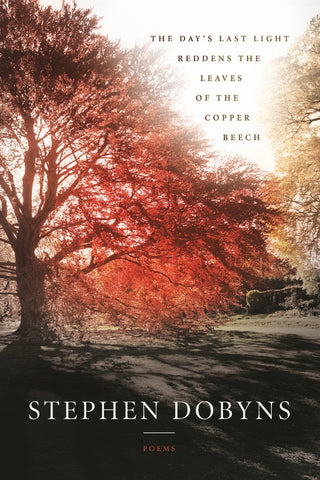
About This Title
This collection from best-selling poet and novelist Stephen Dobyns focuses on the hard, ephemeral truth of mortality, including the section “Sixteen Sonnets for Isabel” about the recent death of his wife; the poem “Laugh," a portrait of the late poet Hayden Carruth; and the poignant parable of a horse in a bar. In true Dobyns fashion, these poems grip and guide readers into a state of empathy, ultimately raising the question of how one lives and endures in the world.
“The Poets Disregard”
Once more Old Anonymous picks up his pen.
What shall he write about this time?
The eternal verities have turned out
less than eternal. Once again endless love
has ended. He ponders composing and ode
to his long time sidekick Death, but as his
own departure draws near their friendship
has grown problematic. The pen of the poet
hangs in mid-air like an arrested rocket.
The world in a grain of sand, the worm
in the heart of the rose—the old subjects
in slinky gowns execute their turns along
the runway of his imagination. At times,
Anonymous thinks, it’s necessary to wait,
and then wait some more. Clocks gobble
minutes like salted nuts as today’s struggle
between the brutal and pragmatic flails away
a stone’s throw from the poet’s disregard,
by the glare of the burning library,
beneath the shadow of the deserted school.
Praise for The Day’s Last Light Reddens the Leaves of the Copper Beech
“This new book by Stephen Dobyns is one of the rare books of poems that actually deserves the adjective ‘unflinching.’ The poems focus on the hard truth of what it means to live in time, to feel that what we love is destined to vanish and that the truths we rely on to bear us forward may prove ephemeral. Instead of skirting the facts by acts of self-removal or by focusing on issues more tractable, the poems give us the front-line news from the disaster zone. In their determination not to deceive or be deceived, they counter the temptation to helplessness by a continuous enactment of courage and honesty. And by their refusing to be jaded or self-pitying, by reaching out to create a large cast of characters, presented in a wide variety of genres, they include us in their circle of concern. Dark as they often are, they leave us strengthened and enlarged.”—Carl Dennis
“Stephen Dobyns’s poems have never been of the Tower, nor do they belong in the parlor. Instead, he has struck me, for over forty years, as a poet of great courage and a restless, relentless imagination. He never, never stops trying to do the impossible: to tell the truth. This is a book of mature brilliance.”—Thomas Lux
“The Day’s Last Light returns us to the origins of poetry: story and song. For nearly four decades, Dobyns has written poetry that interrupts the deadening machinery of our invention to reassert the primacy of human relations and the remnants of wisdom we gain that alight our radiant journeys, which makes him one of America’s most relevant and treasured poets. With characteristic wit and literary surliness, this volume continues his big soul reflections. Right now, someone is checking a math equation hoping to unite theories of relativity and black holes, but you are here with this book in your hand ready for the vigilance and proximity of a voice that is ruminative, erudite, and charged to illumine all the edges of our universe.”—Major Jackson
“It is time to rank Stephen Dobyns among our finest living poets, for he has written several of the strongest poetry books published in the last forty years, and The Day’s Last Light is his most humanly ambitious and imaginatively evocative work to date. Specific death is his subject, the death of his great love, his friends, and his own. His vision reminds one of Shakespeare, hedgeless, unremittingly tragic, but tempered by his absurdist, metaphysical wit, brilliant metaphor, and pragmatism. He never panders, never pumps the emotion. Every poem says, here is this man, inside and out, and the best of them, ‘Sixteen Sonnets for Isabel’ and ‘Laugh,’ his superb portrait of a dying Hayden Carruth, are redemptive.”—Rodney Jones
“For more than four decades, I have been reading indelible poems by Stephen Dobyns and learning from them—about the world, our human dilemma, and the capacity of poetry. Sui generis, he has not yet been sufficiently recognized for his crucial contributions to American letters, particularly his early mastery of narrative, metaphor, and humor, in poems that were always unafraid of conventions. What most I treasure in this new collection is how, like Prospero, he puts aside his magical powers in the sonnet sequence for Isabel, giving us an unadorned, idiomatic record of grief that is both heartbroken and heartbreaking.”—Ellen Bryant Voigt
“Stephen Dobyns is a rare breed, an award-winning poet and a crime novelist whom Stephen King praises.”—Boston Globe
“Poet and novelist Stephen Dobyns brings to us a poignant collection about love, life, and the slow wisdom that ‘all stories are sad when they reach their end.’ . . . Dobyns, whose earlier poetry collections have won prestigious awards including the Lamont Poetry Selection of the Academy of American Poets and the Melville Cain Award from the Poetry Society of America, becomes, in this elegiac collection, a poet attempting at truth, even its most painful and even selfish admissions. Largely confessional in nature, Dobyns's exercise in grief is one to be witnessed.”—Rain Taxi
“[A collection of] courageous observations about the way one endures as he considers big questions about death—of his love, his friends, and himself. [Dobyns] never hides from the tragic and the honest. . . . While this may not be a book about marriage, it is certainly about the lessons the poet has learned through marriage, which he may well be more reflective about now that his wife has passed. Sprinkled throughout the collection are a half-dozen parable poems, offering more lessons and contemplation of them. Dobyns’s brave and sincere poems will remind readers of their own humanness.”—Booklist
“All of the poems are unflinchingly beautiful as Dobyns explores the transience of life on earth. These are poems for those who respect honesty. Dobyns is a poet who is true to the script God offers a fallen humanity. . . . As a whole, Stephen Dobyns’s The Day’s Last Light Reddens the Leaves of the Copper Beech is poetry by a man daring to look death squarely in the eye. He is a poet of great courage as he broods on life and death. His relentless imagination erodes the power of death’s presence and makes of it a lesser reality. Reading Dobyns, one is not alone with the inevitable outcome of our birth. The beauty of his language knocks death from its pedestal.”—The Journal
Publication Date: September 13, 2016
ISBN: 978-1-942683-16-2
© BOA Editions, Ltd. 2016

